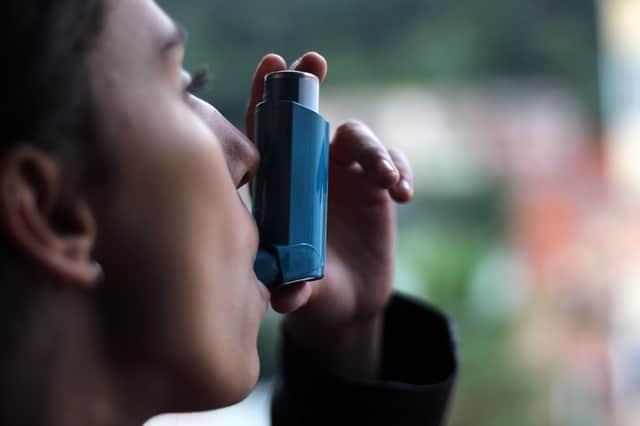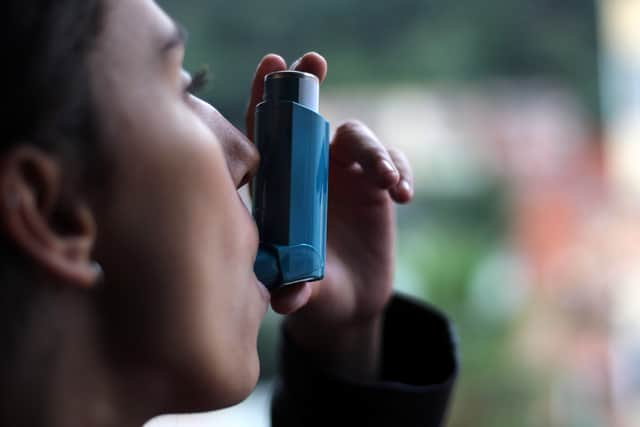Personal Independence Payments: asthma sufferers may be eligible to claim £92 per week - how to check


People with asthma are being urged to check if they are eligible to claim a support payment from the government.
Anyone who suffers from a respiratory condition which affects their everyday life may be entitled to up to £92.40 each week from the Department for Work and Pensions (DWP).


Advertisement
Hide AdAdvertisement
Hide AdMillions of people across the UK with long-term physical or mental health conditions, or disabilities, including asthma, epilepsy and anxiety, can claim support through Personal Independence Payments (PIP).
New figures from the DWP show that nearly 2.9 million people were claiming support through PIP at the end of January this year, with just one in three claimants (35%) receiving the highest level of award.
The data also indicates an increase in the number of people now receiving support for 24 types of respiratory conditions, including asthma, Cystic Fibrosis, Sleep apnoea, chronic bronchitis, emphysema and pneumonia.
If you suffer from a respiratory condition, here’s what you need to know about the payment and how to check if you are eligible to claim.
What is PIP?
Advertisement
Hide AdAdvertisement
Hide AdPIP is a benefit that is gradually replacing the Disability Living Allowance (DLA) and is designed to help with extra living costs if you have both:
- a long-term physical or mental health condition or disability
- difficulty doing certain everyday tasks or getting around because of your condition
There are 2 parts to PIP:
- a daily living part - if you need help with everyday tasks
- a mobility part - if you need help with getting around
Whether you get one or both parts, and how much you get, is dependent on how difficult you find everyday tasks and getting around. You will be assessed by a health professional to work out the level of help you can get and the rate will be reviewed to make sure you are getting the right amount of support.
Who is eligible for PIP?
To be eligible for PIP, you must be aged 16 or over and have a long-term physical or mental health condition or disability where you:
- have difficulties with daily living or getting around
- expect these difficulties to continue for at least 12 months from when they started
You must also be under State Pension age if you have not received PIP before.
Advertisement
Hide AdAdvertisement
Hide AdYou might be entitled to the daily living part of PIP if you need help with:
- eating, drinking or preparing food
- washing, bathing and using the toilet
- dressing and undressing
- reading and communicating
- managing your medicines or treatments
- making decisions about money
- socialising and being around other people
You might get the mobility part of PIP if you need help with:
- working out a route and following it
- physically moving around
- leaving your home
You do not have to have a physical disability to get the mobility part. You might also be eligible if you have difficulty getting around because of a cognitive or mental health condition, like anxiety.
The DWP will assess how difficult you find daily living and mobility tasks, and will look at:
- whether you can do it safely
- how long it takes you
- how often your condition affects this activity
- whether you need help to do it, from a person or using extra equipment
Advertisement
Hide AdAdvertisement
Hide AdYou can get PIP even if you are working, have savings or are getting most other benefits.
What respiratory conditions are supported through PIP?
Many respiratory conditions are supported through PIP to help with daily living or mobility needs. These include:
Diseases of the upper respiratory tract
- Sleep apnoea - obstructive
- Upper respiratory tract - Other diseases of / type not known
Chronic obstructive pulmonary disease
- Chronic bronchitis
- Emphysema
Bronchiectasis
Cystic Fibrosis
Asthma
Pulmonary fibrosis
- Extrinsic allergic alveolitis
- Fibrosing alveolitis
Pneumoconiosis
- Asbestosis
- Pneumoconiosis
- Silicosis
Granulomatous lung disease and pulmonary infiltration
- Sarcoidosis
Disease of the pleura
- Empyema
- Pleural effusion
- Pneumothorax
Heart and lung transplantation
Pneumonia
How much will I get?
PIP is usually paid every four weeks and is tax free so the amount you get is not affected by your income or savings. The amount you get depends on how difficult you find everyday living and mobility tasks.
You will be paid the following amount per week depending on your circumstances:
Daily living
- Standard rate: £61.85 weekly
- Enhanced rate: £92.40 weekly
Mobility
- Standard rate: £24.45 weekly
- Enhanced rate: £64.50 weekly
How do I claim it?
Advertisement
Hide AdAdvertisement
Hide AdTo claim PIP, you will need to contact the DWP on 0800 917 2222 and you will be sent a form to fill out about your condition, after which you might need to have an assessment.
More information about applying for PIP is outlined on the government website.
Comment Guidelines
National World encourages reader discussion on our stories. User feedback, insights and back-and-forth exchanges add a rich layer of context to reporting. Please review our Community Guidelines before commenting.
